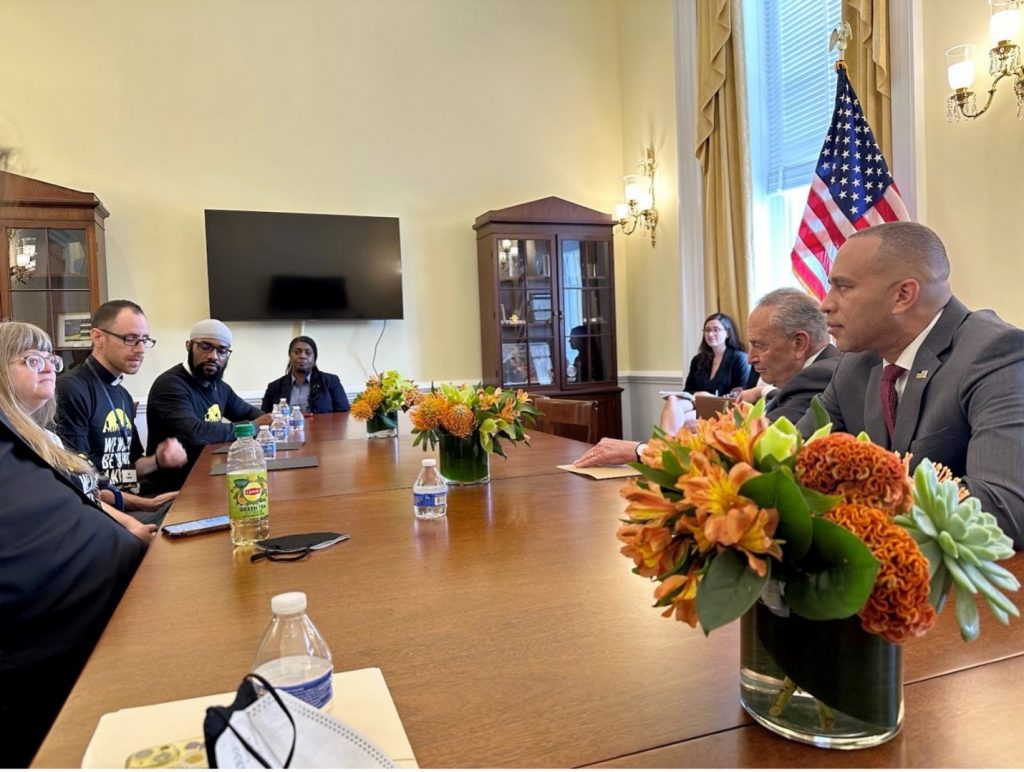Recently I participated in the Poor People’s Campaign Moral Poverty Action Congress, a three-day gathering of hundreds of poor and dispossessed organizers, advocates, and faith leaders from over 30 states. The Poor People’s Campaign: A National Call for Moral Revival is a re-launch of Rev. Dr. Martin Luther King Jr.’s final campaign in 1968, tragically cut short by his assassination. He called for a “revolution of values” and was beginning to organize the poor across all lines of division: race, geography, gender, and ethnicity, into what he called a “Nonviolent Army of the Poor.”
Over 50 years later, the crises of poverty that King identified are in nearly every way worse in our country. The present iteration of the campaign launched in 2018, with six weeks of nonviolent direct action at state capitols, calling for an end to systemic racism, poverty, militarism, ecological devastation, and the distorted moral narrative of Christian nationalism. We’ve continued organizing by identifying, developing, and uniting leaders of the poor, and slowly but steadily building a movement.
This day of the gathering, we descended on Capitol Hill in DC and met with every legislator in our states to deliver our policy demands. As a tri-chair of the campaign in New York, I, along with my fellow tri-chairs, Jamel Coy Hudson and Kelly Smith, had the opportunity to meet with US Senate Majority Leader Chuck Schumer and US House Minority Leader Hakeem Jeffries. We were joined by the National Poor People’s Campaign co-chairs, Rev. Dr. William Barber and Rev. Dr. Liz Theoharis.

As we prepared for the meeting, we had low expectations. We’ve been part of these kinds of visits before (though not with such prominent legislative leaders), and we suspected we would barely have a chance to speak and that the legislators would either be dismissive of us or defensive about their records. They might also fill the time with niceties and small talk.
None of that happened. For nearly an hour, two of the most powerful leaders of the most powerful nation in the world listened to poor people.
Jamel called on them to defend our democracy by protecting voting rights. I shared about members of my community who are essential workers and whose wages aren’t nearly enough to survive. Kelly put it best, saying, “We are not ashamed of being poor or afraid of being called poor. We know why we are poor–it’s not our fault. We are poor because of policy. We know deals are being made, and we are sick and tired of those deals being made on the backs of poor people.”
We talked about how every day in that Capitol building, there are legislators putting forth policies designed to kill poor people, and we needed to hear, publicly from congressional leadership, what they were going to do about it.
At the end of his life, Dr. King said, “If [poor people] can be helped to take action together, they will become a new and unsettling force in our complacent national life.”
We are under no illusions about who these leaders are or what they might do. They were polite; they listened; they responded respectfully. We will meet with them again. We will continue organizing, developing, and uniting leaders from among the poor and dispossessed of society to build that new and unsettling force.
One thing is certain, the most powerful people in the world will not be able to say they didn’t know we were coming.
The opinions expressed in articles posted on Mosaic’s website are those of the author and may not reflect the official policy of Mosaic Conference. Mosaic is a large conference, crossing ethnicities, geographies, generations, theologies, and politics. Each person can only speak for themselves; no one can represent “the conference.” May God give us the grace to hear what the Spirit is speaking to us through people with whom we disagree and the humility and courage to love one another even when those disagreements can’t be bridged.
